One of the common questions I’ve gotten has to do with the English translation of Dragon Quest IV for the DS. Here are some examples:
How do characters speak in the Japanese version of Dragon Quest IV DS? In Eng, they have obnoxious accents.
And:
This is just a quick suggestion but it’s something that’s been sort of bugging me since I noticed it. I read an LP for Dragon Warrior IV and Ragnar was pretty straight-forwardly translated, but then I looked up a video for the DS re-release of the game, and Ragnar and his whole kingdom had a sort of Scottish brogue going on. Was there originally a dialect in his town that was never translated in the NES version, or was that totally made up for the DS version?
I’d heard that recent English-language Dragon Quest localizations use heavy dialects but I’d never really looked into it before. So now’s as good time as any to take a really quick look! But first, a disclaimer – the Dragon Quest/Warrior games are full of little bits of knowledge and translation retcons that only superfans might know, so if I’ve gotten something wrong here or forgotten to mention something here, please let me know!
Okay! First, here’s a sample of English text from Dragon Quest IV for the DS:
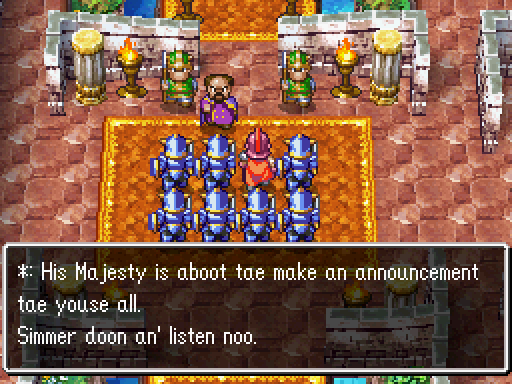 |
That’s indeed a pretty heavy dialect/accent going on there! Plus it’s at the start of the game and used by lots of characters and NPCs here, so I can totally understand why some players might find it unusual or confusing. Here’s that same example line side-by-side with the Japanese version:
 |  |
| Japanese DS release | English DS release |
The Japanese text is… pretty much just regular Japanese text, the formal kind you’d expect a guy in a castle to use. It doesn’t stand out in any way at all, so it looks like the Scottish accent was indeed an addition the localizers made.
Just for further reference, here’s another line shortly after – this time it’s the actual king talking:
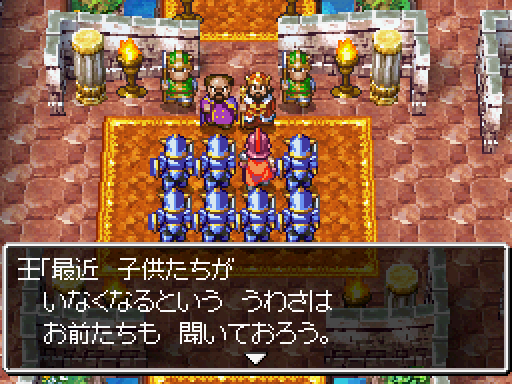 | 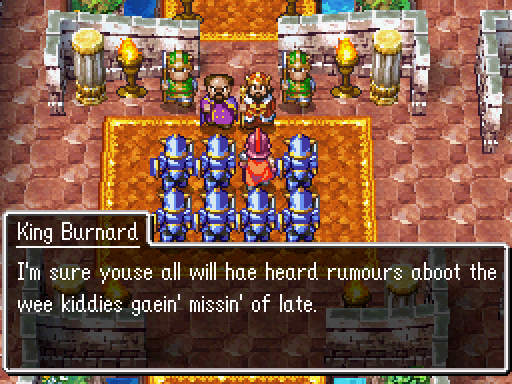 |
| Japanese DS release | English DS release |
Again, it looks like the original Japanese text is pretty standard stuff for what you’d hear from a king; no accents or dialects or anything of the sort. I gotta admit, it’s kind of unexpected to see a king in a Japanese video game saying “youse” and “aboot”, but I also see what the localizers were going for.
For even further reference, here’s what this scene looked like in the original Japanese release and in the original English translation a few decades ago:
 | 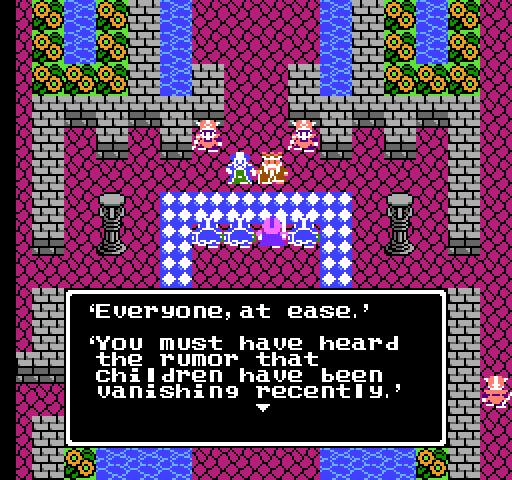 |
| Japanese Famicom release | English NES release |
So it looks like the original English translation stayed much closer to the original text. Neat!
Digging a little deeper, it looks like the DS translation changed things around a little more. First, Chapter 1’s main character is known as “Ryan” in Japanese, but this was changed to “Ragnar McRyan” in the localization. The “Mc” was apparently added in to fit with the Scottish theme the localizers chose to go with:
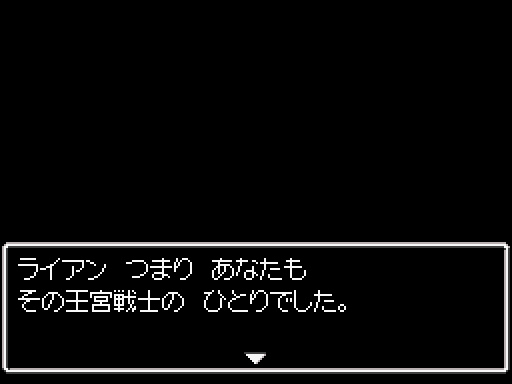 | 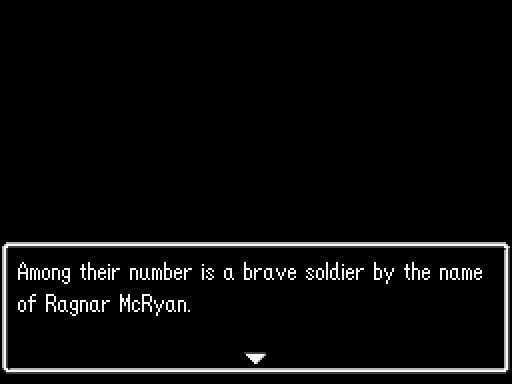 |
| Japanese DS release | English DS release |
It seems his name had been changed to Ragnar in the original English translation, so that’s probably why he retained the Ragnar name in the DS localization:
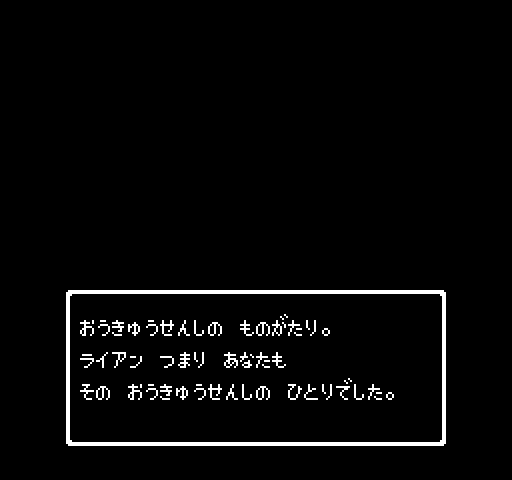 | 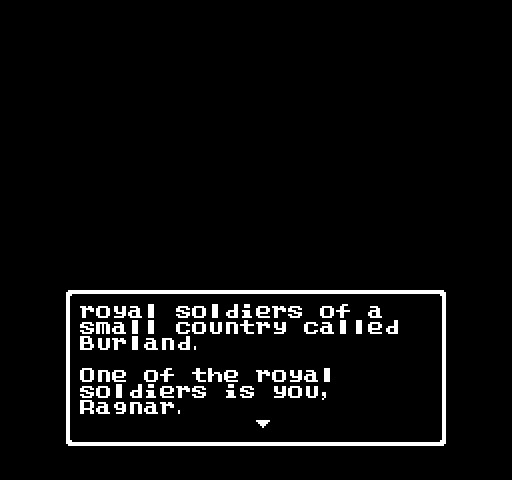 |
| Japanese release | English release |
Upon a cursory glance, it looks like the English DS localization added in a graphic at the chapter title screen and changed the chapter title from “The Soldiers of the Royal Palace” to “Ragnar McRyan and the Case of the Missing Children”:
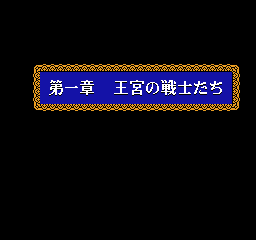 | 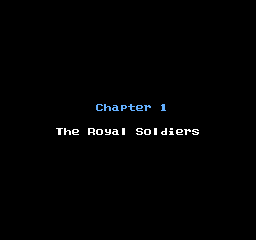 | 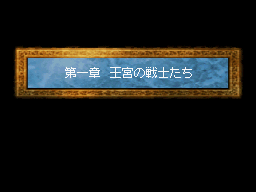 | 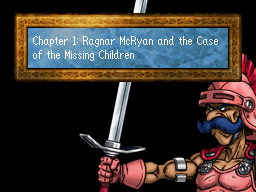 |
| Famicom release | NES release | Japanese DS release | English DS release |
So, just from a super-quick look at the start of the game, it looks like a good deal was changed in the game’s localization – whether it’s for the better or worse is entirely up to the player, but it sounds like the game was pretty well-received outside of Japan, which is what I think matters most.
In general, if you ever encounter a really specific English dialect or a really specific English accent in a Japanese game, you can almost bet that it wasn’t present in the original Japanese text. On the other hand, if you encounter more generic speech styles like “rural” or “spoiled girl” or “noble warrior”, that was probably was in the original Japanese text. This is because super-specific, English-centric speech styles like “Scottish guy speaking in Japanese” dialects generally don’t exist, but “country bumpkin” dialects do.
So how and why did these characters end up talking in heavy Scottish English if the Japanese text didn’t have anything unusual at all? Usually this sort of localization change is the result of someone saying, “This is bland, let’s rewrite things to sound more interesting.” or the result of the reverse localization process that I mentioned recently.
Spicing up localizations with heavy accents and dialects like this is a recent trend in game localization… so if you ever come across any, now you know more about it! And if you ever come across any particularly interesting or wild dialects, let me know. It’s always really cool to see what new tricks localizers come up with.


![press start to translate [Final Fantasy IV] press start to translate [Final Fantasy IV]](https://legendsoflocalization.com/wp-content/uploads/2019/08/bbenma.png)

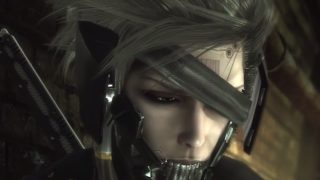

I could see what they were trying to do with the script when I played the game at the time — the different regions of the world look and feel really similar, so they probably thought adding accents would lend a unique character and flavor to the proceedings. Problem is, they immediately slam you with the Scottish accent, which for a lot of folks was borderline incomprehensible, confusing, and stupid-sounding all at the same time. By the midway point you’ve been around the world and hey, yeah, it’s cool to have towns differentiated by dialect, but I know more than a few people who gave up on the game before that payoff. They also removed the party talk feature from the English-language version, which lets you see little conversations between party members after significant story events. Having all the characters chatting with each other in their own accents would have been huge, but I guess they ran out of time and money.
Oh man, I thought taking a detailed look at any DQ game would take a ton of time and have a lot of stuff to write about, I didn’t expect it would have THIS much though. I guess I should’ve realized it, since each game has had multiple releases over the years.
Yeah, since DQ7 they’ve had ridiculous amounts of text. In DQV alone every one of the 7 or so party members has a line or two of dialog in response to nearly every major plot point, let alone minor plot points, interactions with generic NPC’s, and even every new screen in a dungeon.
Also, Ragnar is a Germanic name. I get that changing his name entirely would have been confusing for people who played the original (Oh man, I spent so many hours on it when I was a kid!) but it would have made more sense to give him a Celtic name if they were going for a Scottish-ish setting. Or perhaps make Burland a Norse/Scandinavian-themed country.
I hate dialects in text. I realize that dialogue is not required to be grammatically correct, but seeing stuff like this still makes the copy editor in me weep.
I wonder if this trend has anything to do with the also-somewhat-recent advent of voice acting becoming so commonplace. That is, I wonder if it began, at least in part, through localizers trying to convey a bit more character and flair by stylizing the text in circumstances when voicing it wasn’t possible, and it just spilled over into other projects, becoming a stylistic choice in and of itself. That’s just speculation, of course.
This must’ve been done by the same person (team?) who localized DQIX… heavy accents and slang usage to the point where you need to sound it out aloud for it to make sense sometimes. Occasionally it’s interesting and neat, and other times exhausting (especially when you have to pause what you’re doing to look up words from some obscure British vernacular). But ultimately, since I’m a bit of a language geek, it made for a more rewarding playthrough for me. I’m curious just how much the actual content or nuance of the dialogue was changed with such an extensive localization, though…? Finally, what impressed me most was I came across NO TYPOS or inconsistencies with the various in-game dialects – the translation team’s meticulous attention to detail is outstanding (and I just can’t help but spot any mistakes while reading – blessing and a curse).
Heavy accents, hmm…? Well, Ni No Kuni on the PS3 (a game I’ve mentioned before) has the character of Drippy, the protagonist’s sidekick and exposition fairy. I don’t know what he was like in Japanese (he’s a JPN trailer with his original voice acting: http://www.youtube.com/watch?v=H_J_OSdsYN0), but in the English version, he was given a thick Welsh accent. That was reflected in his non-voiced text as well: Every time he says “your”, it’s written as “youer”; man becomes “mun,” as well as a couple of other things I don’t recall off the top of my head (Though he also has a verbal tic: “Tidy!”). He was also given a surprisingly brusque character who says a lot of blunt and seemingly rude things (like constantly calling the protagonist a crybaby), which contrasts with both his cute-critter design and his role as the healer and support character (which comes through more in the never-localized DS version, since he’s directly playable in that one).
Speaking of games I’ve mentioned before, the same Monster Racers that provided the “Flowrwolf” palindrome also features a character who’s a walking fountain of Australianisms, and 90% of his dialogue is incomprehensible and rapid-fire Australian slang. He is, in fact, meant to be Australian (the world representative for Australia in the monster racing of the title), so it was probably just the translators having some fun.
And you know what the last thing that came to mind was? The Cockney mice in Mother 3! Ahh, but that’s probably one for whenever you get back to updating the M3 translation comparison dealie…
Ooh, nice! I gotta check out more of that Monster Racers game, it sounds like it’s really interesting from a localization standpoint.
And actually I wrote up a thing about the Cockney mice in MOTHER 3 a few years ago for EB Central: http://earthboundcentral.com/2010/08/mother-3-cockney-mice/ I’ll go into more detail whenever I get to that part in my translation notes, but that won’t be until 1034 AT.
Its localization is surprisingly excellent! I have a lot of affection for the game, partially because of how surprisingly good and funny the writing is. It reminds me of the job Nintendo did with the Paper Mario games over here: Lots and lots of wordplay, affectionately parodic humor, and knowing winks to the audience.
Bringing it all together, I could have sworn one of the Mario RPGs had an item in it called “Dodgy Syrup”–syrups being quite common items in Mario RPGs, but “dodgy syrup” also being a Cockney slang term meaning “obviously wig.” But I have no idea which it was, or if I’m just making it up whole cloth…
The Super Mario Wiki has no such item listed, but there is the “Dodgy” status effect, and as you said, there are like three different Syrups: Honey, Maple, and Gradual. However, the closest I can come to a relation is that Syrups (at least, before SPM) restore FP, which may be used to activate Flurrie’s “Dodgy Fog” move, which is one way to confer said status effect.
Drippy/Shizuku is playable only for a short while in the DS version. He has only a very weak attack, and a defensive buff, but that’s it. After you learn how to capture monsters (after getting the Harp) he is made unavailable in the party selection for good, which is a shame considering his 3D model in the menu is gorgeous for a DS game.
Besides that, the team translating Ni no Kuni DS is stalled right now because they don’t have any translators available, despite having all the tools and files ready. If anyone loves the game and would like to help with the Japanese text, be my guest.
http://gbatemp.net/threads/ninokuni-shikkoku-no-madoushi-translation-project.310214/page-29
The PS3-exlusive Zodiarchs in No no Kuni had a pretty difficult antiquated pattern of speech in the Japanese version, from what I hear.
Drippy had an Osakan accent in Japanese, and he was indeed rather brusque.
The recent DQ games and remakes are infamous for this (along with bad puns). I really hate it though, it’s just annoying to try to interpret sometimes (although I love the puns). I put up with it though since the DS versions of 4, 5, and 6 really are the best versions. Ok, maybe the PS2 version of 5 was better, but that was never released outside of Japan.
Though i don’t know Japanese, some quick online research has shown me that the Japanese games are filled with puns, too. The accents, however, are indeed a product of the English versions. I honestly don’t mind, though, since i rather like when dialog text tries to emulate the way people talk like that. Plus, it’s kinda been around since the very beginning, with the first two games using Elizabethan-style English, so i guess i’m just used to it (even though i only started playing since last year)
From my experience (far more limited than yours), regional or other dialects are very common in Japanese RPGs, and are extremely difficult to represent accurately in English. The idea of using established accents/dialects in their stead, to retain the distinction if not the nature of the distinction, is a reasonable one – though I’m not sure it’s one I’d go with myself, nor one I’m entirely comfortable with.
Inserting dialects where the original Japanese didn’t have the distinguishable dialects or other speech patterns – as seems to have happened here – is quite another matter, however, and I’d be inclined to say that there’s not really any excuse for it.
As a translator I’m pretty much in agreement, but the localizer side of me can also understand the need to spice things up. Actually, I kind of wonder if that should even be called localization – in a way it feels more like an adaptation. I dunno, I need to sit down and think about the word “localization” – it seems to have like a bunch of different meanings, many of which have different philosophies behind them.
One other game that comes to mind is Chrono Cross on the PS1. That game REALLY goes overboard on the accents, and i’ve only ever gotten little more then an hour into the game, so as bad as i’ve seen in it, i’m sure it only gets worse.
You know, Chrono Trigger is one of my favorite games of all time, so i really wanna play the sequel, mainly for the story. But between the annoying accents, the rediculous amount of characters (whom i’m sure a good chunk of them probably have little to no impact on the story), and the insanely f-ed up battle system, i’ve never been able to get very far in the game without giving up. It’s the same with Final Fantasy VIII, which took me like five or six attempts before i was finally able to complete it just cuz of the idiotic draw/junction system. Ugh, i swear someday i’ll beat Chrono Cross.
The thing with Chrono Cross is that all the characters speak in their unique (and often annoying) ways in the Japanese version too, which is what actually put me off of the game when I first played it way back in 2000. In fact, there were so many different Japanese speaking styles that the head localizer actually had to add some new programming to keep the unique speech stuff intact in English.
Sorry for the dumb question, but do you know any Japanese site with examples of the Chrono Cross accents? I once got curious but found nothing.
Oh man, it looks like that’s one of the things I’ll have to compile and write up someday as an article… So many characters though 😯
Anyway, with a quick search the best I can find is this: http://en.wikipedia.org/wiki/Characters_of_Chrono_Cross#Accent_system
And this: http://www.neogaf.com/forum/showthread.php?p=14173953
Thank you!
I don’t think we went way overboard with the accents in Chrono Cross, just maybe a tad. Either way, they don’t bug me much. I enjoy them, actually. Gives the game a nice touch. Sure, there’s the occasional sentence I have to read a time or two to figure out what they’re saying, but overall I don’t think it’s too bad.
It’s definitely a good game, though. The battle system takes a while to get used to, but it’s not as “f-ed up” as you think. It’s just different.
Same with Final Fantasy 8. It’s not everyone’s cup of tea, but I personally enjoy it. Part of that might be nostalgia kicking in though, it was one of my very first PS1 games and I remember playing it as a child (I didn’t understand half of what was going on, but it was still fun)
Not to be a buzzkill, but if you don’t like the characters or the gameplay, and the whole reason you want to beat Chrono Cross is for the story… let’s just say the game can get even worse.
That depends on how you view the story. For 2000, it was quite compelling and well written. I know that if analyzed today, a lot of people just say the plot is really convoluted and is full of holes. I can’t deny it, but the messages hidden underneath all the various scenarios and the true ending make it worth as many runs through the game as you can handle.
Personally I find the Chrono Cross accents to be a great touch. The dialogue would have been really dull otherwise.
I’m pretty much right there with you. Chrono Cross and FF8 were pretty massively f-ed up. Though I’m the opposite; I did eventually force myself through Chrono Cross, but FF8… after about forty hours I suddenly realised that I still hadn’t had any fun at all, and just kind of stopped and never looked back. It is to date the *only* video game I have ever lost — I mean literally physically lost, like I have no idea where the discs are and this does not bother me.
The neat thing about Chrono Cross, though, is that it starts out sort of lousy but promising, and then somehow manages to get consistently worse until eventually it ends.
The aboot thing kinda reminds me of this Nostalgia Critic scene. http://www.youtube.com/watch?v=DjbvYgxAoDA
The Dragon Quest games started their fascination with various dialects with Dragon Quest 8, the first game released with an overhauled translation style. One of the features they added to the localization was full voice acting, and they decided to put it to use by having characters from different regions of the world have different accents. But this was rarely shown in text, it was mostly handled by the voice acting.
DQ4DS was released afterwards, and it’s apparent they tried to recreate that feeling from DQ8, but without voice acting the only thing they could do to make the differing accents clearer to players was to write it more phonetically in the text, and use more foreign terms and slang. This seemed to have backfired, as many people had difficulty understanding the dialogue, and didn’t find it as charming as before. The later Dragon Quest games toned it down a lot, but they still try their hand at it. For example, writing dialogue for NPCs who live in small villages and farms with a “country hick” accent.
I seem to be in the minority that liked the accents. According to the head of the localization team, they added the accents in order to make the world feel more epic. The whole premise of DQ4 is that all these characters from different parts of the world are joining forces with the Hero to battle evil, so the accents help underscore the whole “global” feel. They even gave the animals in each region equivalent sounds. (e.g. dogs in the “Russian” area say “gav” instead of “bark”.)
The original DQ4 had a cool story, but the text in the NES version was very bland and didn’t convey much of the playful tone of the Japanese version, so I find the DS script with its puns and silly accents to be a huge improvement.
I really liked them, myself, and wouldn’t have enjoyed the game as much without them. It was some nice world-building. I liked the “lame wordplay” too, which I pretty much consider essential to Dragon Quest.
The guilty party here is a two-person “translation” group that calls themselves Plus Alpha. Their slogan is “You’d never know it started in Japanese.”, and they are quite true to that slogan indeed; personally, though, I’d argue that a better slogan for them would be “You’d never know we read the original script”, or even “You’d never know it used to be enjoyable.” Better yet, “We don’t give two hoots about the games we translate.”
For some reason, they were picked to be the new translation AND localisation group for the Dragon Quest series starting with Dragon Quest VIII. They’ve undone various attempts at staying truer to the original Japanese text (such as in the GBC re-release of Dragon Quest I and Dragon Quest II; “Dragon Warrior I & II”, and the English release of Dragon Quest VII) and instead riddle the entire script with lame puns and summarial translations. They also have not kept any of the Japanese version’s character names in the Dragon Quest games (to my knowledge) aside from “Slime” and “Dracky”.
Furthermore, they’ve stated in an interview with DQShrine that they’ve occasionally received hate mail calling them out on their trolling (hereafter known as “localisation choices”) and that they wish people could “…express their disappointment in more measured ways.”
At the end of the day, Plus Alpha adds more than just 「プラスアルファ」 to their “translations”; they essentially replace the original script with what I can only assume to be an old script for some comedy show that they wrote up that was never picked up by a producer (perhaps due to it not actually being funny in the slightest).
Ah, thank you. I’ve always wondered who the clowns were who were butchering the poor Dragon Quest series.
You’re exaggerating. Although all enemies’ names are changed, the new translations have very naturalistic dialogue that makes me actually want to talk to NPCs. Beyond that, clearly they don’t just ‘replace the original script’ with something from ‘some comedy show they wrote up’; comparing the two you can clearly see the script was translated.
Let’s see, a quick google search shows that everything they’ve done has been personally approved by Yuji Horii, the franchise’s head writer, and also the fact that the Japanese versions are also littered with lame puns. Heck, there’s another article on this very site dealing with a pun in DQ4.
Turns out, the old translators were much, *much* more guilty of script-replacing. Have a look at this: https://gamefaqs.gamespot.com/boards/688276-dragon-quest-vii-fragments-of-the-forgotten-past/77164275
Also, the scripts are actually really good, and a lot less dry than the old translations.
I’ve been a Dragon Quest fan for a long time now, and I grew up with the Dragon Warrior localization canon. So I was pretty disappointed when Square Enix turned everything on it’s head with an entirely new canon that abandoned almost everything that had been established before. Personally, I felt that it was almost insulting to us Dragon Warrior / Dragon Quest fans, as we really loved the original canon. Now the only ” new Canon ” Dragon Quest game that I’ve beaten was Dragon Quest IV DS, and it was a heart wrenching experience for me. As awful as this may say, I have decided that until the localization changes to a more faithful one, I won’t buy any Dragon Quest games in English anymore. Seriously, the ” new canon ” makes me literally sick. I understand the need to make dialogue and all that good stuff interesting, but the localizers simply take things just too far. My belief is that dialogue in a video game should be smooth and comprehensive, and that you shouldn’t have to ” stop and think ” to try and figure out what’s going on. I know that this may be too much to ask, but I think that a full localization comparison of Dragon Quest IV DS would truly expose to the English speaking world just how terrible the so called ” localization ” really is. Sorry new canon lovers, but I just had to get that off my shoulders.
The only Dragon Quest game I’ve played was Dragon Quest V for the DS. And I LOVED it. the accents everyone is complaining about were supposed to be read aloud, which reminded me of how Shigesato Itoi loved making the text in his Mother games fun to read aloud as well. Which, of course, he took from Dragon Quest.
Still, like others said, the way they changed the way certain characters speak can put people off. Like there’s this character called Sancho. He talks with a very stereotypical Mexican accent (his text even has upside down question marks whenever he asks something) and although he’s supposed to be your father’s loyal friend and guardian, I could sadly never take him seriously because he always sounded like Speedy Gonzales instead of somebody cool like Pancho Villa. I wouldn’t have minded so much but he’s the only Mexican in the entire game, whereas with other accent speakers they have whole communities of them.
I’d love to play the fan translations of the original Super Famicom release one day, I just don’t know if I’ll ever get to it. Sounds like they at least made Sancho sound better.
That’d be an over-the-top reference to Sancho Panza, Don Quixote’s faithful companion: http://en.wikipedia.org/wiki/Sancho_Panza
On a related note, the character “Torneko” was originally given the name “Taloon” in the English Dragon Warrior 4 (though the English-language releases of his spinoff series of roguelikes kept his name as Torneko, just to be confusing). In the DS remake, they do in fact call him “Torneko Taloon,” just like the “Ragnar McRyan” chimera.
They like doing that sometimes. Like Robotnik is now the man’s name and Eggman is his nickname. And I believe a certain Street Fighter character is “Charlie Nash” now.
Ah, this is so cool! Thanks for answering my silly question. :B
It’s funny reading these comments and seeing all the games that are mentioned, because they all go back to Richard Honeywood. Chrono Cross? Richard Honeywood. Ni no Kuni? Richard Honeywood. Dragon Quest 8, which set the tempo for the other DQ localizations? Richard Honeywood. The man loves his accents and dialects. It’s always fun to see the reactions to them, too. He did the translation for Layton Brothers on iOS and people thought the game was poorly translated because one of the main characters was using a coarse British accent.
Ha, yeah, he’s really into his accents. I gotta say, I actually admire that – I’m not gutsy enough to make that big of a leap in my work. I think the closest I ever got was with the Cockney-speaking mice in Mother 3, and that was only a few lines of text. So I definitely admire the guy for his localization guts 😛
I was reading the article and thought to myself “hmm…this makes me think of the dwarves in FF9”, sure enough Mr. Richard Honeywood localized it too!
I beat this in English, then played it in Spanish up until the last chapter. They did some really weird stuff with Spanish dialects, too. I’m not a native speaker, so I can’t identify it as accurately as a Spanish native could … plus it’s been years since I played. But I seem to remember every region had something unique. The weirdest one was Chapter 2, Alena’s chapter, where many verbs are left unconjugated (meaning they end in R) and a unique font was used so that all r’s look like the Cyrillic ya (like the backwards R you see in the Toys R Us logo).
Hi! This is old but I just finished the game in Spanish and I wanted to talk about the accents in this version. It’s Spanish with an exaggerated accent from different countries or regions in Spain. Just like actors (and voice actors) do in movies.
For example:
Alena -> Russian. The “R” is supposed to sound hard.
Torneko -> middle east. They add an “i” in some places: “barato -> bariato”, “vender -> viender”.
Meena and Maya -> French. Replace “r” with “g”.
Riverton -> They just add “vite” at the end to imitate Argentinian spanish XD
Juanchito (the guy with the caravan) -> Ecuadorian, i think.
And there’s also a town speaking with Andalusian accent. There’s probably some other accents but I can’t remember right now.
The ‘random use of Cyrillic letters for things they kind of look like in the Roman alphabet’ thing was also done for one character in DQV DS. I would imagine that for someone who knows how that alphabet’s supposed to be read, it might be very hard to read.
That’s certainly true, everytime I see someone using faux Cyryllic alphabet for ‘it will look cool when we use Я instead of R and so on’ I want to bang my head against the wall. When I saw this poster http://www.impawards.com/2006/borat_ver2_xlg.html – I was pretty sure that movie is called ‘Voyadt’ with Я (ya) mirrored. It took some time for me to catch on that my friends were talking about the same movie as I’ve seen on poster.
And I’m not even native speaker, just learned Russian at school (for 2 years).
as someone who’s not a native english speaker, the first time I tried playing the game, it was on a ds flashcard, I was so confused by those accents that I thought there was some kind of Anti-piracy code to mess up the text!
I actually gave up on the game for a while because I couldn’t understand anything from the first chapter and i didn’t even know what to do
my english was not as good at the time, but it wasn’t so bad..
I’d really like to know which kind of accent each one was
This is the biggest reason I’m against the use of heavy accents/dialects in video games. It’s hard enough for native speakers, but it’s near impossible for non-native speakers 🙁
I’m glad I’m not the only one who found the accents obnoxious. The article only touched on the dialogue in Chapter 1, which was painful enough, but I remember when I got to Chapter 2 it got so bad to the point it was just unreadable. I knew the story since I can read Japanese and had played the Famicom version, but even if I couldn’t, I’d have had an easier time reading that than try to decipher whatever dialect they were using. Thankfully I found that this game has the full Japanese text in the data which can be enabled with an Action Replay. I’d surely have never finished the game without it.
Like, why does it suck so bad? Well, I have one complaint – one fucking complaint about this dialogue: I can’t read it. Now what’s the most important aspect about any story? Well, being able to fucking read it!
If you can’t read it, maybe it’s your brain that was at fault*. I had no problem reading any of the accents in DQ4 and found the whole thing added incredibly to the atmosphere and charm of the game.
*not intended to be an insult, just to say maybe you don’t have a mind suited to accents.
They’d been doing it since the original release of 8. I don’t really mind it though. It’s even better in 4, because you can tell when an NPC “came from” another region just by how they spoke. It was a real treat, and I’ll always enjoy the livelier translations than the old, ultra-stiff ye olde englishe translations.
I HATE the accents in DQ4 DS. It’s annoying and hard to read. I gave on the game because of it.
I’ve never met someone who actually enjoyed these accents, they ruined Dragon Quest in English for me. They sound horribly offensive and out of place, I can’t see why Square Enix thought it was a good idea. And they completely ruin the original’s ‘classic child’s book/fairy tale’ style that made the series so popular in Japan.
I’m spanish but I usually prefer to play games in English, mainly because of the names being similar to japanese and the text fitting much better in menus. I can read in english just like I do in spanish, but with this game I had to go back to spanish because it was really annoying having to stop and decipher almost every line. They also used accents in spanish, but it’s much more readable. In any case, I prefer good dialog no accents, or really soft accents, I recently started DQ6 in english, and I can identify an american accent almost at the beginning of the game, which throws me off almost completely, because it doesn’t even make sense with the medieval fantasy setting.
I just recently got into this series. It started at the end of last July when i went to my local state fair and found a copy of Dragon Warrior 1 on NES for $7 in the shopping pavilion. I was instantly hooked, and proceeded to go online and buy the rest of the series. I was able to get 2 and 3 on NES fairly cheep, and since 4-6 and 9 on DS weren’t that old, i was able to get all of them brand new for standard retail price. Same with 7 and 8 on 3DS, which only came out like a year ago. Then before i knew it, i found that i had addictively plowed through the first 6 games in exactly 6 months. I was a bit burned out after 6 (mainly due to a massive week-long grind-fest to prepare for a post-game superboss), so i took a break for a while. Now i back into it with 7, but this time i’m playing at a more slow and leisurely pace.
Anyway, I actually like the accents in the DS games. I actually think it fits perfectly fine after the first couple of games used an Elizabethan-style English in their localizations. Yeah, they can sometimes be a bit tricky to read at a glance, but i still feel like they give the series some nice flavor. Plus, i looked up some cutscenes from that one recent Heroes game on youtube, and i really like the way the voice actors in that game pulled off the accents. It really makes their voices sound unique and memorable.
Also, just as a side note. After i finished Dragon Warrior II on NES, i felt like i finally “got” Earthbound Beginnings/Mother 1 and all its satire.
Judging by the graphic of the soldier they added, I feel like the localization team had been having a lot of fun with this and Ragnar McRyan pretty much became an inside joke!
The translation didn’t seem too bad to me, specially when I like to write with a transliterated dialect and speak with mimic accents in certain kinds of context (Mostly bored or in comedic tense), and I don’t feel like it’s terrible, because I think that what Richard Honeywood did for the translation was hella bold and it felt like a breath of fresh air from all of the more coarse scripts (Too bad the talking option was removed, because it woulda been a cacophony because ‘a the accents and dialects).
And it’s hella hilarious that they’re bothered with this, while the original DQ games had Elizabethian English in the script (And I like how the GBC games also had a quite coarse, yet decent translation style that followed the Horii script by a perfect 1-1 gap) that was quite hard to understand…
I also hear that the Spanish release did something similar, in a way comparable to movie dubs (Like, hard Rs for the Russian style villagers in Alena’s chapter, and constant I’s in Torneko’s village, because they’re Eastern European)
I danna like da accentz in dragooon warriare/queste remakes cawse eet es abnawkous en weigh tooo paynefull tooo reed!
There was a weird ultra-minor thing in some of the 3DS Pokémon games where there were characters that inexplicably had Scottish accents. The first was in PMD: Gates to Infinity with a Herdier NPC, and while I can kinda see where it’s coming from given that its evolutionary line is based on the Scottish Terrier, the character’s grandson, a Lillipup, had no accent whatsoever. The second was with two NPCs, an old man and an old woman, in Mauville City in Omega Ruby/Alpha Sapphire. I guess they were either supposed to be tourists (presumably retroactively from the Crown Tundra) given that Hoenn is based off of Kyushu or it was similar to how translations sometimes turn Kansai accents into New York or Southern accents and they originally had some other accent in Japanese, but it’s still pretty weird to me, and especially so in hindsight, given how the Crown Tundra contains NOT ONE CHARACTER with that level of Scottish accent in it!